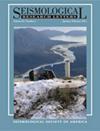流体在意大利南部2013-2014年m5 Matese地震序列震源参数中的作用研究
IF 3.2
3区 地球科学
Q2 GEOCHEMISTRY & GEOPHYSICS
引用次数: 0
摘要
摘要研究了2013-2014年意大利亚平宁山脉南部Matese地区发生的Mw 5.0地震序列中Brune应力降(Δσ)、表观应力(τa)和Savage-Wood辐射效率(ηsw=τa/Δσ)的变化规律。该层序在13-22 km深度范围内聚集在一个相对较小的地壳体积内,这比发生在距离轴下的背景地震活动和正常断层层序(通常位于地壳的前15 km)要大。我们发现,对于大多数位于狭窄地壳体积的分析地震,Savage-Wood辐射效率值很高,其值范围从远高于自相似值到高达0.55的非常高的值。此外,在不同深度的两个类似震级的事件中,观测到辐射效率的大变异性(高达90%)。以前的研究报告了流体参与马泰地震成核过程的地震证据。结合最近发表的地壳地球物理数据,我们提出大多数以高ηsw值为特征的地震都在位于亚德里亚结晶中壳的高孔压带内成核。根据2013-2014年大部分地震的横波/纵波波幅比分析,认为深部高孔隙压力流体在破裂过程中发挥了作用,是造成剪切-拉伸混合震源的主要原因。本文章由计算机程序翻译,如有差异,请以英文原文为准。
Investigating the Role of Fluids in the Source Parameters of the 2013–2014 Mw 5 Matese Seismic Sequence, Southern Italy
Abstract We investigate the variability of Brune stress drop (Δσ), apparent stress (τa), and Savage–Wood radiation efficiency (ηsw=τa/Δσ), in the 2013–2014 Mw 5.0 earthquake sequence that struck the Matese area in the southern Apennines range of Italy. The sequence is clustered in a relatively small crustal volume in the 13–22 km depth range, which is greater than that of background seismicity and normal-faulting sequences that occurred under the range axis, usually located in the first 15 km of the crust. We find high Savage–Wood radiation efficiency values for most of the analyzed earthquakes located in a narrow crustal volume, with values ranging from well above the self-similarity value to very high values as high as 0.55. In addition, a large variability in radiation efficiency (up to 90%) is observed for two similar magnitude events at different depths. Previous studies reported seismic evidence of fluid involvement in the nucleation process of the Matese earthquakes. By integrating our results with crustal geophysical data published recently, we propose that most of the earthquakes characterized by high values of ηsw are nucleated within high pore pressure zones located in the crystalline midcrust of Adria. We reckon that high pore pressure fluids of deep origin played a role in the rupture process and were responsible for the mixed shear-tensile sources inferred from the analysis of the S-wave/P-wave spectral amplitude ratio for most of 2013–2014 earthquakes.
求助全文
通过发布文献求助,成功后即可免费获取论文全文。
去求助
来源期刊

Seismological Research Letters
地学-地球化学与地球物理
CiteScore
6.60
自引率
12.10%
发文量
239
审稿时长
3 months
期刊介绍:
Information not localized
 求助内容:
求助内容: 应助结果提醒方式:
应助结果提醒方式:


